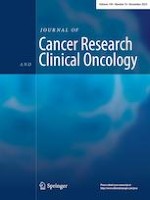Erschienen in:

17.08.2023 | Research
Survival benefit and impact of adjuvant therapies following FOLFOX-HAIC-based conversion therapy with unresectable hepatocellular carcinoma: a retrospective cohort study
verfasst von:
Yangxun Pan, Ze Yuan, Jiongliang Wang, Siegmund Ngai, Zhiwen Hu, Liyang Sun, Zhenyun Yang, Dandan Hu, Minshan Chen, Zhongguo Zhou, Yaojun Zhang
Erschienen in:
Journal of Cancer Research and Clinical Oncology
|
Ausgabe 16/2023
Einloggen, um Zugang zu erhalten
Abstract
Background
Recently, the conversion therapies of FOLFOX-HAIC for patients with unresectable hepatocellular carcinoma (uHCC) have dramatically increased the tumor responses and conversion rate; thus, the prognosis of uHCC patients was expected to be prolonged. However, the postoperative recurrence of uHCC patients who successfully underwent conversion therapies stayed high. The present study evaluated the efficacy and safety of postoperatively adjuvant therapy in treating uHCC patients who received FOLFOX-HAIC-based conversion therapy.
Methods
In this real-world retrospective study, uHCC patients who received FOLFOX-HAIC-based conversion therapy were included. The recurrence-free survival (RFS), as primary outcomes, was compared between patients who received adjuvant therapy (AT group) or non-adjuvant therapy (nAT group) using survival analysis and Cox regression. Imbalances in baseline clinical features between the two groups were adjusted through propensity score matching (PSM) and inverse probability of treatment weighting (IPTW).
Results
Between January 2016 and December 2022, 204 uHCC patients who received FOLFOX-HAIC-based conversion therapy were included and assigned into AT group (n = 47) and nAT group (n = 157), respectively. The median RFS was significantly longer in the AT group than the nAT group before adjustment [19.2 vs. 10.8 months; hazard ratio (HR), 0.584; 95% CI, 0.383–0.892; P = 0.028], after PSM and after IPTW. Subsequent subgroup analyses revealed the RFS of adjuvant therapy was best in uHCC patients with younger than 60 years, macrovascular invasion, and positive hepatitis B surface antigen.
Conclusion
Postoperatively, adjuvant therapy was associated with improved survival outcomes compared with non-adjuvant therapy after FOLFOX-HAIC-based conversion therapy among uHCC patients, especially for patients with macrovascular invasion and positive hepatitis B surface antigen.











